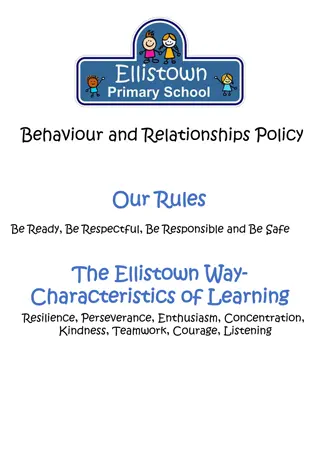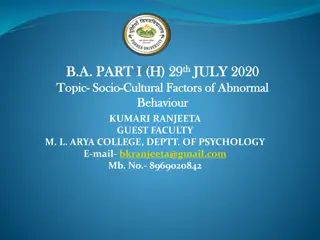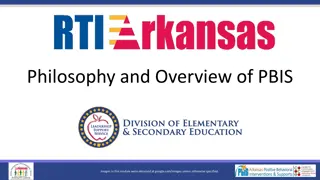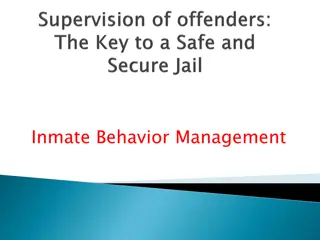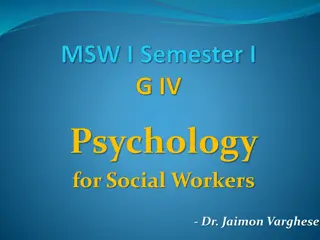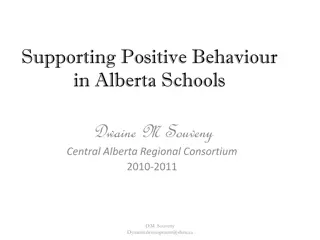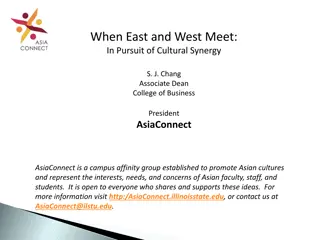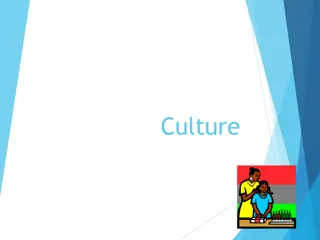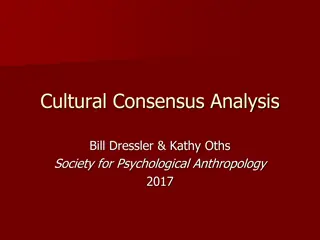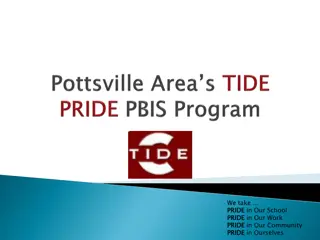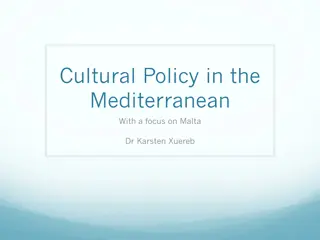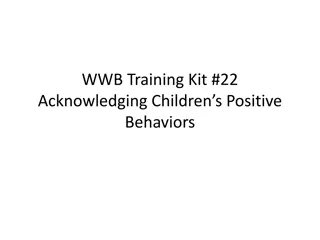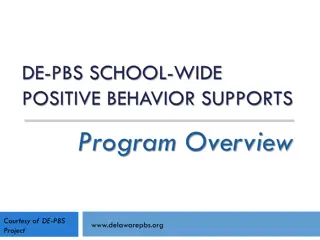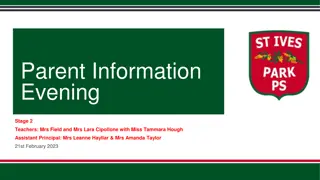Fostering Cultural Understanding and Positive Behavior in School
Cultivating a diverse and inclusive environment in school through various activities and initiatives, promoting cultural appreciation, moral development, and positive behavior among students. Encouraging engagement in arts, sports, and educational opportunities while emphasizing respect for cultural diversity and ethical values. Parents' involvement, feedback, and support play a vital role in creating a safe and rewarding learning environment for children.
Download Presentation

Please find below an Image/Link to download the presentation.
The content on the website is provided AS IS for your information and personal use only. It may not be sold, licensed, or shared on other websites without obtaining consent from the author.If you encounter any issues during the download, it is possible that the publisher has removed the file from their server.
You are allowed to download the files provided on this website for personal or commercial use, subject to the condition that they are used lawfully. All files are the property of their respective owners.
The content on the website is provided AS IS for your information and personal use only. It may not be sold, licensed, or shared on other websites without obtaining consent from the author.
E N D
Presentation Transcript
LKS2 Beliefs(religious or otherwise) informing perspectives on life. Sense of enjoyment, fascination for learning about themselves, others and world around them. Use of imagination and creativity and reflection on experiences. Recognise the difference between right and wrong. Understanding the consequences of actions. Interest in investigating and giving reasoned views on moral and ethical issues. Spiritual Moral Social Cultural Understanding the appreciation of cultural influences and links with heritage. Willingness to participate in Arts, Sport, Mathematical, technological scientific and cultural opportunities. Respect for cultural diversity Willingness to participate in a variety of social settings, utilising a range of social skills. Cooperating with others and resolving conflicts effectively. Interest in and understanding of the way communities and societies function.
Recognition of particular date/events e.g. Christmas, Remembrance, Anti Bullying Week, multicultural/religious days. Having visitors and parents into school to discuss their religions/cultures. Parents regularly feedback to teachers that their child enjoys school and is engaged with the learning opportunities we provide. Children take part in Key Stage performances Nativity plays, class assemblies. Children attend trips on visits to community areas. Reflecting on every day incidents. Big question in assembly. Answering the register in different languages. Children take part in first hand experiences regularly in topics. Children perform and share their learning to their parents or their peers. Use of imagination.
Parents are invited into school to talk with children about their religion and culture bringing in artefacts etc. Children take part in whole school workshops and celebrations Art projects, Science Week, World Book Day, Red Nose Day, National Respect Day, Enabling Enterprise. Learning via the Mexico topic customs, food. The school runs a number of trips to facilitate widening cultural experiences History WW2 topic evacuees, visiting air raid shelters, persecution. Charity events promotes cultural diversity Jeans for Genes, World Charity board in the hall. Literacy stories from other cultures. Afri-Twin project whole school. Year 3 Mexican pen pals. Newsround talking about local news, etc. Whole school sports day everyone is celebrated. A range of musical events throughout the year including theatre visits in school, storytelling and music workshops, sharing assemblies and Christmas show, Lion King production. Celebration of key yearly events that link to children s cultures and wider cultures e.g. Chinese New Year, Diwali, Christmas, Hanukah, National Poetry week. Voting for Golden Time activities.
Students feel safe in school. Consequences are always followed through and any serious or repeated incidents are logged, in line with the schools behaviour policy. Every child has a personal reward chart and there are strategies in place for children that need them. Regular parental involvement in school, particularly through the behaviour management tool Class Dojo. Feedback from parents is consistently high about how happy their child is at school. Children are always encouraged to right any wrongs through actions, whether that is sorry card/letter, community help at school. Children understand the idea of a positive climate for learning that encompasses a stepped approach to behaviour management and a culture that constantly celebrates and rewards success and achievement. Children are rewarded for good behaviour and consequences are followed through should inappropriate behaviour arise, in line with the schools behaviour policy. Targeted groups for intervention to support academic progress, attendance and self-esteem. Children vote in their classes on different ideas that they would like to see happen, or to make class decisions. School Councillors are implemented and they are responsible for being a leading voice and representative for the class. They have bi-weekly meetings to discuss any issues with councillors from the rest of the school and the coordinator. Children have a clear understanding of consequences for their behaviour and that some consequences are more serious than others. Parents are always informed of consequences given. Regular Parents evening and Annual Reports.
Weekly Celebration Assemblies ensure children feel proud of their achievements and are recognised for their successes. They are invited along with the whole school. Children are invited to share their successes and experiences from home that are important to them. Children are taught resilience, problem solving skills and encouraged to persevere through their learning Enabling Enterprise. Children are often asked to reflect on their learning and talk about what they enjoyed and what they would like to do next. Children can take part in extra-curricular clubs, if they wish to. All Pupil Premium children will attend at least one club throughout the year. Children are taught social skills and have access to intervention programmes to support them in the development of social skills. All children are assessed continually to determine whether they would benefit from an intervention to support their social skills.




